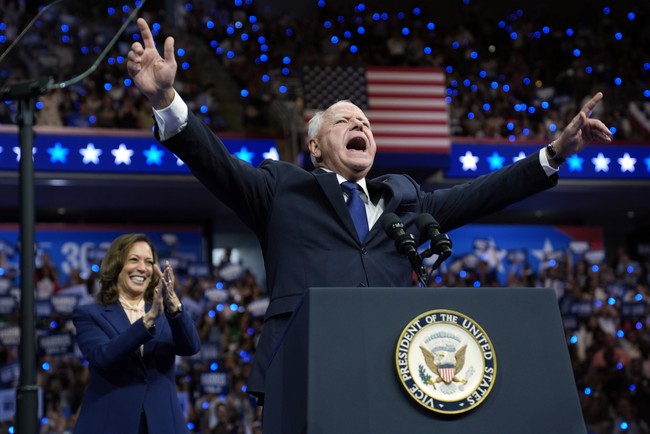As President Biden continues to assess the damage and receive briefings on recovery efforts in the storm-affected Southeast for a second consecutive day, he faces renewed political attacks from former President Trump.
With the death toll from Hurricane Helene nearing 200 and many still unaccounted for, millions are left without power or access to clean water, and damages are projected in the billions. Trump took to social media Thursday morning to label Biden and Vice President Kamala Harris as incompetent. He stated, “Kamala and Sleepy Joe are universally being given POOR GRADES for the way that they are handling the Hurricane, especially in North Carolina. It is going down as the WORST & MOST INCOMPETENTLY MANAGED ‘STORM,’ AT THE FEDERAL LEVEL, EVER SEEN BEFORE.”
In the midst of a tight race with Harris—just weeks ahead of the November Election Day—Trump has criticized the Biden administration’s response to the storm for nearly a week. The hurricane’s impact is particularly significant in North Carolina and Georgia, both of which are key battleground states for the upcoming presidential election.
Over the weekend, Trump accused Biden of “sleeping” at his beach house in Delaware while the storm wreaked havoc on the Southeast. Upon arriving in Valdosta, Georgia, to survey damage and deliver relief aid, Trump asserted that “the federal government is not being responsive,” incorrectly claiming that Biden had not communicated with Georgia Governor Brian Kemp.
In response to Trump’s critiques, Biden emphasized his ongoing communication with federal, state, and local officials throughout the weekend and stated that he returned to Washington, D.C., on Sunday afternoon to monitor the rescue and relief efforts. “We had over 1,000 federal personnel, including search and rescue teams, at the ready on the ground before it hit,” Biden said on Tuesday. He added, “Over the past several days, I’ve been in regular contact with the governors, the mayors, the county officials, and all the affected areas. That includes Florida, North Carolina, South Carolina, Georgia, Tennessee, Alabama, and Virginia.” He reassured that his administration has deployed “every available resource that we have at our disposal to the affected region” and committed to being present until recovery is complete.
Most of the fatalities from the storm have occurred in North Carolina, where entire communities have been devastated by swift floodwaters. Governor Roy Cooper lamented, “Communities were wiped off the map” as floodwaters receded.
Biden was in North Carolina on Wednesday, surveying damage from a helicopter over Asheville, one of the hardest-hit areas, and visiting a rescue command center before proceeding to South Carolina. “My top priority is to ensure the communities devastated by this hurricane get the help and support they need as quickly as possible,” he stated during a Cabinet meeting focused on the federal response. Prior to his trip, he authorized the use of up to 1,000 active-duty troops to aid in relief efforts. “In a moment like this, we put politics aside,” Biden emphasized, noting, “We have here – there are no Democrats or Republicans, only Americans – our job is to help as many people as we can, as quickly as we can, and as thoroughly as we can.”
Trump further criticized Harris on Sunday for attending “fundraising events with her radical left lunatic donors” in California instead of being in the disaster-stricken areas. He reiterated this sentiment during his visit to Georgia, stating, “The vice president, she’s out someplace campaigning looking for money.”
The White House has countered by highlighting that Harris was in communication with federal, state, and local officials over the weekend. Harris noted that she and Biden “remain committed to ensuring that no community or state has to respond to this disaster alone.” On Monday, she visited FEMA headquarters in Washington, D.C., to receive updates on relief efforts. “We will do everything in our power to help communities respond and recover,” she asserted.
Harris traveled to Georgia on Wednesday to assess storm impacts and provide updates on the federal response. “We are here for the long haul,” she told residents in Augusta, Georgia, adding that there would be significant work needed in the coming days, weeks, and months.
Originally slated to participate in a campaign tour in central Pennsylvania—a key battleground—Harris diverted her schedule to address the disaster response in Georgia.
During his visit to Georgia, Trump highlighted his efforts to provide relief, stating, “I’ve come to Valdosta with large semi-trucks, many of them filled with relief aid.” He mentioned that a GoFundMe page established by his campaign had raised over $4 million for storm victims.
Biden indicated that he plans to visit affected areas as soon as possible but noted that it would be disruptive to do so immediately, stating, “We will not do that at the risk of diverting or delaying any of the response assets needed to deal with this crisis.” Harris also committed to being on the ground as soon as possible, emphasizing that emergency response operations must take precedence.
The optics of Trump’s visit to Georgia may have increased pressure on Biden and Harris. Republican strategist David Kochel remarked that Trump has been “very aggressive” with his rapid trip to the storm-damaged region, suggesting that “he’s out there pushing a line that they don’t care – they’re not doing anything and I think they’re reacting to it.”
The response to natural disasters can significantly influence political fortunes. President George W. Bush faced heavy criticism for his initial response to Hurricane Katrina in 2005, and Trump received backlash early in his presidency for his handling of the recovery efforts in Puerto Rico following a devastating storm.
 Telegram is where we really talk. Don't miss out!
Telegram is where we really talk. Don't miss out!








